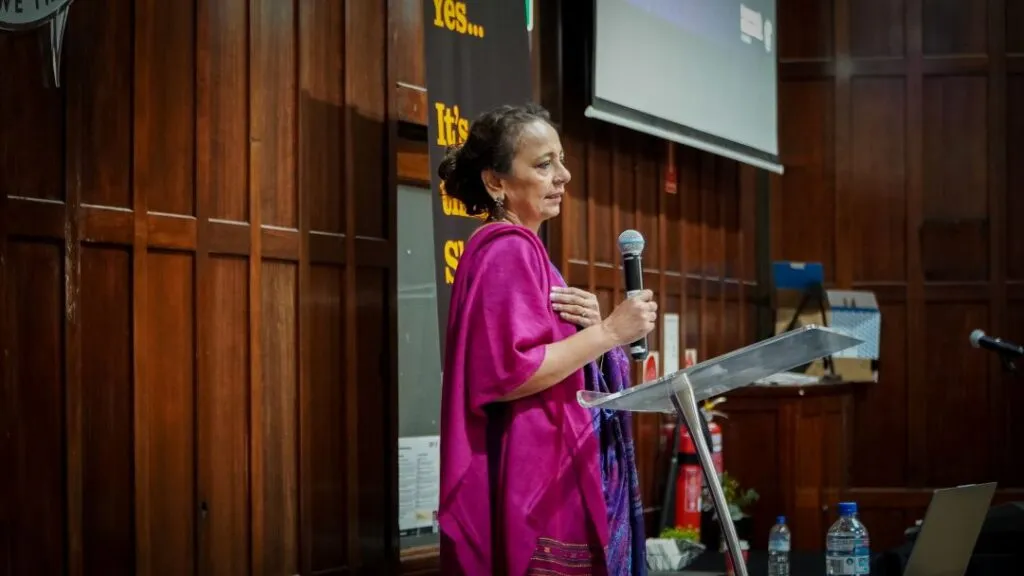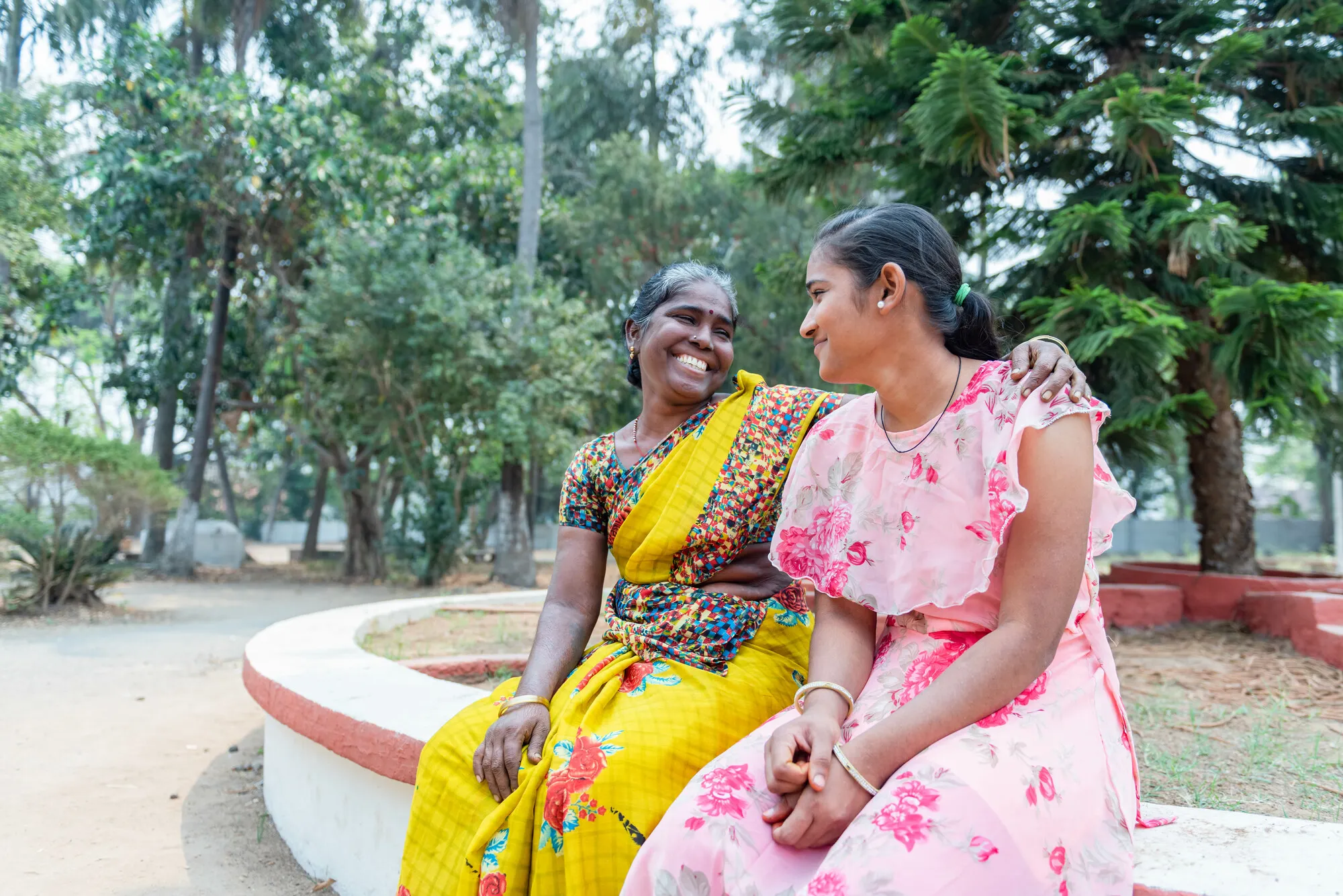Growing up in India, Nikita Sarah harbored a deep fear of leprosy. Society had instilled in her the belief that those affected by the disease should be avoided, and the physical deformities she often saw only heightened her fear. Yet, despite this, her grandfather’s passionate advocacy for The Leprosy Mission Trust India inspired her to face her own prejudice.
“I never knew the meaning of the phrase ‘my heart weeps’ till I joined The Leprosy Mission because there have been so many cases where I felt not just a tug in my heart, but I felt my heart break into many, many pieces looking at the situation of people,” she says.
“I was stunned. We are very proud of our tigers in India – everywhere we invest so much in Save the Tiger. You see the hoardings all over but despite the fact that India holds the largest global burden of leprosy, nobody talks about leprosy.”
Nikita says that the Indian government declared leprosy eliminated as a public health problem in 2005, and since then leprosy was integrated into general health services, falling off the radar.
”It took a lot of passionate advocacy from The Leprosy Mission to persuade the government to collaborate in launching an awareness campaign to support its goal of eliminating leprosy by 2027.”
Nikita said that when she first lobbied the Union Minister of Law to repeal discriminatory laws against people affected by leprosy, his response was one of surprise knowing that current statistics of leprosy in India. He directed us to meet the chairman of the Law Commission and work with them to repeal laws’ That was a very good direction because the government at that time was looking at repealing all the outdated laws and with that, The Lepers Act was repealed,” she says.
When The Leprosy Mission researched India’s laws and regulations that discriminated against people affected with leprosy, they discovered there were not 19 but 119 laws. But when they tried to gather evidence of people facing discrimination because of these laws, they discovered that people were not aware of them. When she tried to find cases of discrimination to bring before the courts and lawyers, she drew a blank. Nikita realised that a sensitisation campaign across the country was needed.
“When we did focus group discussions, we would ask people, ‘Have you faced any discrimination?’ They would say no. And we would say, ‘Would you go to that big temple to worship?’ They said, ‘No, no, no, they don’t allow us to go there because we have leprosy. And they’re absolutely right because it’s God’s curse upon us. So, we built our own temple.’ They didn’t realise that their rights were being violated.”
The Law Commission released a report specific to leprosy, Report 256, that provides for a non-discrimination clause for anyone affected by leprosy and their family members by individuals, government and private establishments. It also reaffirms the right to equality as guaranteed by the Constitution: the right to access healthcare, adequate housing, education, employment and other basic amenities.
“We were part of it, and it’s divided into two parts. One was the draft bill to ensure that a host of existing laws get repealed in one go. The other was affirmative actions for the state and central governments to take.”
“The government has this very, very strong leprosy case detection campaign set into motion. So, they’ve already predicted that the numbers are going to go very high and then by 27 they’re going to decrease. They’re actively going door to door looking for people affected by leprosy, but that’s not the right way. Many people refuse to come out because of the stigma. You need to ensure that there’s a health-seeking behaviour.”
“We were most happy when the Marriage Act was amended. It’s so difficult to believe that in this day and age, you could still have a Marriage Act that the moment you’re diagnosed with leprosy, you can ask for divorce on the grounds of that.”
Advocacy is continuing to repeal public health acts in certain states that ban a person affected by leprosy, whether a child, woman or man, from going to school, going to the marketplace, or entering public transport.
“These are all outdated laws and even the legislative people within that state are not aware such laws exist. So that is something that we are working on, but it’s a lengthy process.”
Asked if she believes it’s a realistic goal to achieve equal rights for people with leprosy, “It’s a realistic goal, but it needs all the stakeholders to come into the picture, including people affected by leprosy.”
“We have a long way to go, but we’ve seen the shift in generation. The current generation who has leprosy doesn’t feel that way. However, there hasn’t been a lot of empathy, so we still have a long way to go.”
Nikita admits that even she, after 13 years working in this field, still has a lot of assumptions and misperceptions. “I went to a hospital recently and saw a young, beautiful girl over there, educated a little bit. She came from a village and had severe deformities, she was admitted to a hospital, missing out on her studies and everything with deformities.
“So, I asked her, ‘Why did you come late? You were educated, you knew about leprosy, and you were diagnosed on time, but you still neglected it despite knowing it can lead to disabilities.’ She said ‘My father is a daily wage worker. I have six brothers and sisters. My father is taking me from the village in about two days. He has to spend two days here and go back two days, so that’s almost six days gone before he can go back to work’ … That gives you an idea of the intricacies around seeking treatment.”
Awareness is still the biggest obstacle Nikita sees to achieving zero transmission, zero disability, and zero discrimination because of leprosy.
“The epicentre of it all, the core of it all, is awareness. Awareness among the right stakeholders is a huge gap. India is unlike other countries because of the boundaries that we have in terms of different states, different cultures, languages, and behaviour changes. We have to come up with unique awareness programs in which nobody wants to invest. There’s a lot of investment in research. There’s a lot of investment in many other things, but one thing very few people, including the government, realize is that the day you want to stop transmission, you have to invest big time in awareness programs across all demographics.”

Nikita has a message for every Australian – you can make a huge difference in bringing down the numbers of leprosy cases by telling others about it whether by word of mouth or social media.
“Don’t think that because you are in Australia or New Zealand that you cannot do anything. You can reach out and help. You can share that information. You can volunteer. You can work towards ending leprosy and each person has a role to play.”


